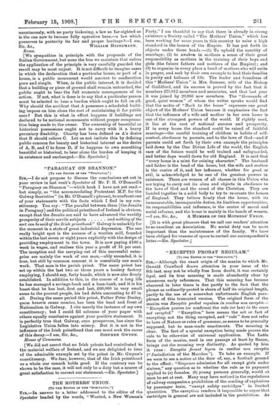"PARAGUAY ON SHANNON."
LTO THZ EDITOR OF Till "SPECTATOR.' _I
do not propose to discuss the conclusions set out in your review in last week's Spectator of Mr. F. H. O'Donnell's "Paraguay on Shannon "—which book I have not yet read— but simply, as "the accommodating Protestant M.P. for the Galway Sacristies" (in Mr. O'Donnelra phrase), to confront one of your statements with the facts which I find in my con- stituency. You say : "The parallel between them [the Jesuits in Paraguay] and the political priesthood of Ireland is obvious, except that the Jesuits are said to have advanced the worldly prosperity of their servile subjects and nothing of the sort can be said of the Irish priesthood." Galway is unluckily for the moment in a state of great industrial depression. The one really bright spot is the success of a woollen mill, founded within the last seven or eight years explicitly with the design of providing employment in the town. It is now paying 2100 a week in wages, and realises this year a profit of 15 per cent. The inception and the carrying out of this successful enter- prise are mainly the work of one man,—ably seconded, it is true, but still by common consent it is essentially one man's work. That man is the parish priest. The same priest has set up within the last two or three years a hosiery factory employing, I should say, forty bands, which is now also firmly established. In addition to this, in the course of a long life he has managed a savings-bank and a loan-bank, and it is his boast that he has lent, first and last, 260,000 in very small sums to the poorest people, his bad debts amounting to 27 in all. During the same period this priest, Father Peter Dooley, quern honoris causa nomino, has been the head and front of Nationalism in Galway. I cite merely the instance of my own constituency ; but I could fill columns of your paper with others equally conclusive against your positive statement. It is perfectly true that Galway, once prosperous, has since the Legislative Union fallen into misery. But it is not in the influence of the Irish priesthood that one must seek the cause [We did not assert that no Irish priests had contributed to the material welfare of Ireland, and we are delighted to hear of the admirable example set by the priest in Mr. Gwynn's constituency. We fear, however, that of the Irish priesthood as a whole our remark holds good. If the contrary can be shown to be the case, it will not only be a duty but a source of great satisfaction to correct our statement.—ED. Spectator.]




































 Previous page
Previous page